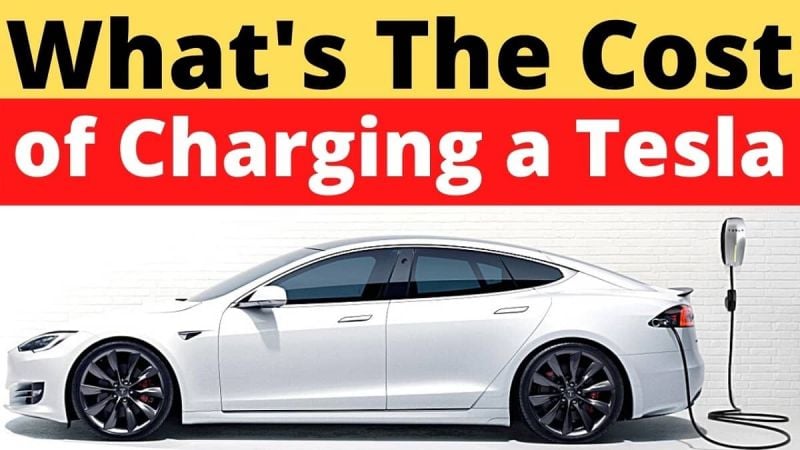According to Teslanomics on average, the cost to charge a Tesla per month in the US is around $49. It also depends on how much you drive and where you live.
Chris Smith, a Tesla Model 3 owner from Minneapolis, says it's 3 cents a mile for him and his Model 3. He says it’s 10.5 cents per kWh where he lives, and that’s about average. US average is 10.42 cents per kWh. Tesla electric bill per month can vary a lot from state to state, just like gas prices: Hawaii is much more expensive, Nevada is a fair bit less.
Smith explains that EPA puts the Model Y at 28 kWh per 100 miles. If you are doing 80 mph on the interstate all the time, that cost goes up. But if you are in town and 55 mile per hour roads, it will go down some. If you have a lead foot your electric bill will move up, and if not, it can go down. If it’s cold out it can go up and if not, it can go down.
"If you have free chargers nearby where you drive your Tesla that can go down too (and your electric bill would go down if you mostly supercharge, but the actual cost to “fuel” your Model Y would be higher). If you have off peak charging deals, that can cut your Tesla’s electricity cost by up to 1/3 in some places which is really nice (Most people can charge at night when they sleep, which is when A/C’s and other electrical usage is lower)," Smith writes.
But 3 cents per mile is a good fair number for your Tesla’s electricity bill per mile. It also depends on your driving habits. So going off averages, say 12k miles a year, thats 360 dollars a year, or $30 a month. Not bad right? In fact, here is how much you save charging a Tesla compared to ICE cars.
Bill Davey, a Tesla driver from Arizona, says depending on time of year the off peak rate changes between 7.38–7.59 cents per kwh. “I drive about 850 miles per month,” writes Bill in a Quora response to a question regarding how much Tesla adds to your electric bill per month. Davey says last month he had a combination of home charging, Super charging for a road trip to California, and free charging at his hotel A total of 208 kwh was at home at a rate of $0.0738 per kwh. Total addition to his home electric bill $15.38.
Tesla Monthly Charging Cost in UK
But if you live in Europe you Tesla’s monthly electricity bill may be way different. In the UK, if you get an EV specific tariff at around 8 pence per kWh for 4 hours overnight, but with a raised rate of 35p for the rest of the day, and you charge a typical 20 miles a day, you will pay around £1.10 a day extra, writes a Tesla owner from the United Kingdom. On a more conventional single rate tariff it would be £1.40 a day extra. I am assuming mainly town driving and a light foot.
"If you drive your Tesla about 40 miles a day on average, that would be £1.34 a day extra on the EV tariff on your monthly electricity bill, or £2.24 extra on the standard tariff.
That compares to around £3.20 a day fuel for 20 miles in an efficient mid sized ICE vehicle, or £6.40 for 40 miles a day," explains Mike Richmond from the United Kingdom.
So, for the average driver in the UK, a Model Y might save them £750 a year in fuel, or £1,700 a year for a high mileage driver.
Now let's get back to the United States and look at some national averages. Like I said, your Tesla's home charging cost depends on the amount you drive and the cost of electricity in your area and the efficiency of your car.
But if we rely on averages:
• The average cost of one kilowatt hour (kWh) in the USA is $0.12.
• The average driver drives 1,500 miles per month.
• Tesla’s generally require around 25 kWh/100 miles.
So 1,500 miles is 375 kWh - which adds about $45 to your monthly electricity bill.
But this is tremendously variable - some parts of the world have much more expensive electricity - some have cheaper.
Most people charge at night - and most electricity utilities have ways to get cheap rate electricity at night.
• Average price of gasoline in the USA in 2020 was $2.60. Currently it’s $4.20
• Average gas consumption of a US car in 2020 was 26 mpg,
So a gas car owner who drives 1,500 miles/month requires 57.7 gallons of gas - which now costs about $242.
My electric provider is Duke Power and it sends me a notice almost every month that says I use more electricity than my “efficient” neighbors. So if your neighbors don't Tesla you can calculate the difference and get a ballpark idea of what the monthly charging cost of your Tesla is in your state.
If you charge your Tesla at home, remember you will pay for it next month, rather than paying a gas station immediately.
Armen Hareyan is the founder and the Editor in Chief of Torque News. He founded TorqueNews.com in 2010, which since then has been publishing expert news and analysis about the automotive industry. He can be reached at Torque News Twitter, Facebok, Linkedin and Youtube.
Set as google preferred source












Comments
Now add the cost of children
Permalink
Now add the cost of children dying mining the raw materials for the batteries. Still worth it ? Ill never buy an electric vehicle. I wont be complicit in killing children.
Same goes for cell phone
Permalink
In reply to Now add the cost of children by Daniel Babin (not verified)
Same goes for cell phone parts…do you use those???
Ok, no more oil or natural
Permalink
Ok, no more oil or natural gas.What are we going to build our highways with (no asphalt) or get the energy to make concrete?